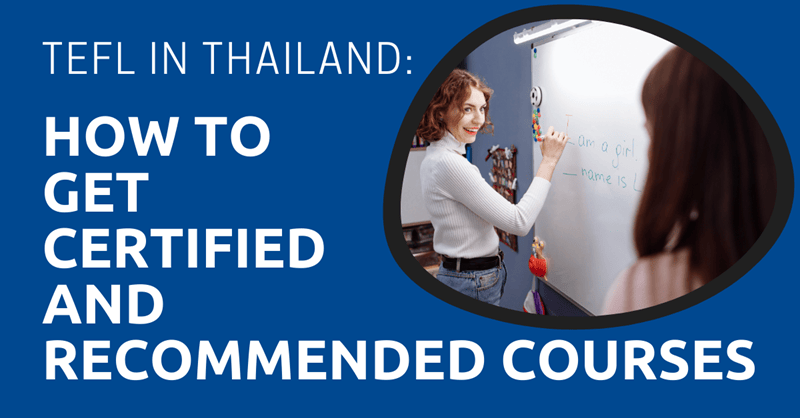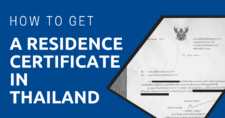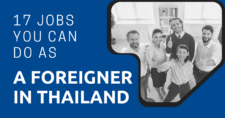
Teaching English as a Foreign Language (TEFL) has long been a convenient way for former tourists to stay in the ‘Land of Smiles’ long-term.
Native speakers are in high demand across Thailand’s schools to teach the locals English, and the bar for entry in many cases is comparatively low.
Plus, with Thai labor laws restricting non-Thai nationals from most jobs and putting up steep barriers for companies to hire expats for the rest, it’s one of the few opportunities out there for people without specialized skills or knowledge.
In this guide, we’ll walk you through the process of getting TEFL (that’s Teaching English as a Foreign Language) certified here in Thailand. We’ll evaluate whether getting certified gives you any professional advantages, as well as where you can actually take your course.
We’ll also look at the next steps in professional certification, such as the DELTA.
"*" indicates required fields
Disclaimer: This article may include links to products or services offered by ExpatDen’s partners, which give us commissions when you click on them. Although this may influence how they appear in the text, we only recommend solutions that we would use in your situation. Read more in our Advertising Disclosure.
Contents
Why Get TEFL Certified?
Your standard English teacher job at a basic Thai government or bilingual school doesn’t require a huge amount in the way of qualifications – usually, a bachelor’s degree is good enough. However, if you want to give yourself a bit of an edge in the job market and improve your chances of getting a decently-paid job, it’s worth considering taking a TEFL course.
Besides providing you with an extra string to your bow when it comes to applying for jobs, TEFL courses can also teach you a number of skills that will be useful in the classroom, such as teaching techniques and the basics of grammar.
Most TEFL courses are relatively inexpensive (certainly when compared to getting a MEd) and can be completed quickly, so there are plenty of good reasons to consider taking one.
Online vs Offline TEFL Course
TEFL courses come in many shapes and sizes. Some require you to show up to classes in person and practice your newly-learned teaching skills on real-life people.
Others can be completed from the comfort of your own living room or bedroom over the internet. And then there are those that offer a fusion of the two (normally a face-to-face weekend followed by an online component).
Which course is right for you will depend on a number of factors. These include:
Skills
When it comes to honing your teaching skills, face-to-face courses are the better option. All the online courses in the world are no substitute for standing in front of a room full of students and giving it a go for real.
However, if you’re already a little experienced in teaching (or even public speaking more broadly), it may be feasible to settle for an online-only course to cover the basics.
Local School Observation
A TEFL school in Thailand may also put you in a class of a local school so that you can observe for yourself how teaching English in Thailand works. You can have more ideas about whether or not you like to teach English there.
This is a great benefit that an online class cannot give to you.
Cultural Awareness
Another important aspect of an offline class is that they will teach you about the cultural awareness that you should know when teaching English in Thailand.
It can show you exactly how teaching in Thailand is different than in your home country. You will also learn how to deal with other teachers in the school, and minimize the chance of experiencing culture shock.
Cost
Face-to-face courses are going to be much more expensive.
For example, a 4-week in-person course with ITA averages around US$1899, as opposed to just US$1599 for a 170-hour online course.
Plus, there are other expenses such as accommodation (if you’re doing the course in a different city than your own), transport, time missed from work, etc.
Time
If you’re in a rush to get into the classroom, face-to-face courses are a safer bet. They can generally be wrapped up in around four weeks, as opposed to as long as eleven weeks for online courses.
However, the downside is that face-to-face courses tend to be more intense.
Additional Factors to Consider
When choosing a TEFL course in Thailand, there are other factors you should consider as follows:
Number of Hours
Most employers will expect you to have completed at least 120 hours of training as part of your certification, so courses that offer that much (and ideally more) are the ones you should focus on.
Assistance
If you’re opting to learn on-site in Thailand and you’re arriving from abroad for the first time, you might want to consider looking at courses that offer extra support.
This may include airport pick-up, accommodation, and/or language and culture orienteering. Obviously, if you’re an old Thailand hand, you can probably forgo these extras and save some money.
Job Opportunities
Many TEFL courses offer an additional route to employment, normally at a language center, once you’ve become certified, be it through paid internships or even full-blown full-time work.
Granted, these are rarely the highest-paying or most desirable teaching jobs out there. But they will help ease the transition for those who are worried about job-seeking in a new country.
TEFL Courses in Thailand
There are a number of providers offering TEFL certification in Thailand, so you can incorporate it into your holiday if you wish. These include:
SEE TEFL
SEE TEFL are a long-established TEFL course provider based out of Chiang Mai. Accredited by both the Thai Ministry of Education and the British Training Qualifications UK (TQUK), they are known for offering ‘all-through’ style courses which take you from absolute novice to a full-fledged and employed TEFL teacher.
Recommended Course: For absolute Thailand beginners, the Paid TEFL Internship course is a solid bet. It includes a four-week 120-hour on-site TEFL certification, followed by a supported internship at a local Thai school for a semester (around 4 – 5 months). They also offer a normal 4-week TEFL course for US$1395.
Extras: Included in the price is support for acquiring a Non-B work visa, 30 nights’ stay at the Darley Hotel, airport collection and transfer, assistance in acquiring a Thai SIM card and bank account, and a one-day excursion to Doi Suthep.
Requirements: To qualify for the course, you’ll need to be a native English speaker, hold a recognized bachelor’s degree, and be between the ages of 21 to 50.
Cost: Opting to complete your internship at a school in Chiang Mai will set you back US$2650, while choosing to do your internship somewhere else in Thailand will cost US$2450. The basic TEFL course costs US$1395.
TEFL Heaven
TEFL Heaven is a good choice for those who want to take their TEFL while also getting a few beach hours in. You’ll get to complete your on-site course at the resort town of Hua Hin, and TEFL Heaven’s marketing really leans into the social side of getting certified.
Recommended Course: TEFL Heaven offers a standard four-week 120-hour on-site TEFL course, with a guaranteed job placement once complete.
Extras: Airport pick-up, beachside accommodation, Thai language classes, visa support.
Requirements: You’ll need to be a native English speaker. Note that you’ll also need a bachelor’s degree to take up their work placement offer for work permit purposes.
Cost: All in all, the TEFL Certificate course costs US$1997.
International TEFL Academy
International TEFL Academy (ITA) has been around for a little over a decade, and in that time, has developed a strong reputation for their courses and post-certification support.
With a network of over 2500 schools across Asia, they’re a solid choice for those who want to be eased into working in Thailand.
Recommended Course: ITA offers 4-week full-time 120-hour on-site TEFL courses in Hua Hin and Chiang Mai. There is also the option to bundle your course up with ITA’s highly-flexible Job Placement Program.
Extras: Airport pick-up, welcome beach BBQ, visa support, cultural excursions. The Job Placement Program offers 40 hours of comprehensive Thai cultural orientation and language lessons, as well as ongoing support.
Requirements: Must be a native English speaker. Non-natives can enroll after submitting an essay and completing a phone interview. A BA degree is not required to enroll in the course, however, it is required to qualify for a Thai work permit.
Cost: The TEFL course alone costs US$1395. The Job Placement Program is US$1799.
Greenheart Travel
Greenheart Travel is an American-based company offering a wide variety of travel-related excursions and activities, from summer camps to school exchange programs. Among their offerings are a number of TEFL and TESOL certification programs, including some based out of (inevitably) Chiang Mai and Hua Hin.
Recommended Course: For absolute beginners, there’s the combined on-site TESOL Certificate and job placement package, while there’s also an online option for those who want to save a few bucks.
Extras: Accommodation, medical insurance, airport transfer, transport to Hua Hin, group introductory dinner.
Requirements: To be eligible for Greenheart’s TESOL courses, you will need to be a native English speaker (or able to provide evidence of C1 or above English-language ability), aged between 20 to 58, and ideally have a BA (although it’s not a requirement, it will certainly make your life easier).
Cost: The Job Placement and TESOL certificate bundle is US$2660, while replacing the face-to-face with online is US$2160.
Online-only Options
If you don’t have the time to dedicate to learning face-to-face, there are a number of providers out there offering online-only routes to TEFL certification. These include:
The TEFL Academy: The TEFL Academy is an award-winning and UK/US government-recognized TEFL certification provider, offering a number of reasonably-priced online courses. The standard TEFL course offered is Level 3, which will give you your requisite 120 hours. However, if you want to take your learning to the next level, you can also opt for the Level 5 diploma course, which will take you up to 168-hours. Non-native English speakers who are rated C1 or above may also apply. The 120-hour course costs US$144, while the Level 5 is US$197.
i-to-i: i-to-i is a longstanding TEFL company offering a range of routes to becoming TEFL-qualified. Like the TEFL Academy, they also offer the standard Level 3 120-hour certification and the extended Level 5 180-hour diploma. However, i-to-i really take it up a notch with advanced diplomas that last 300, 400, and even 500 hours! Once you’re certified, they also offer a paid internship program which provides you with a fully-paid and supported teaching job in Thailand, as well as familiar bonuses such as airport pick-up and a few ‘cultural experiences’. The standard 120-hour TEFL cert costs US$429, while the cheapest advanced diploma (180 hours) costs US$759.
TEFL Course Comparison
Here’s how the providers compare:
| Provider | Recommended Course | Hours | Price | Location | Job Placement |
| See TEFL | 4 week TEFL | 120 | US$1395 | Chiang Mai | Yes |
| TEFL Heaven | 120-hour on-site | 120 | US$1997 | Hua Hin | Yes |
| International TEFL Academy | 4 week on-site | 120 | US$1395 | Chiang Mai/Hua Hin | Yes |
| Greenheart Travel | On-site TESOL/job placement | 120 | US$2660 | Chiang Mai/Hua Hin | Yes |
| TEFL Academy | Level 3 | 120 | US$413 | Online | No |
| I-to-i | Level 3 | 120 | US$429 | Online | No |
Should I Get TEFL or CELTA/DELTA for Teaching English in Thailand?
As a general rule, your standard 120-hour TEFL Certificate will be more than adequate for the vast majority of ESL-teaching jobs in Thailand, provided you’ve also got a BA degree and can make it through the interview without stealing anything.
However, for those who really want to stand out in the crowd and shoot for the best jobs, you may want to consider taking the next step and getting a CELTA/DELTA.
CELTA and DELTA are two highly-regarded qualifications offered by Cambridge English Assessment. CELTA stands for Certificate in English Language Teaching to Adults, and as the name suggests, it focuses more on the adult side of English-language teaching (business English, basic conversation, etc.).
DELTA stands for Diploma in English Language Teaching to Adults, and is only open to qualified and experienced teachers, so standards are high.
Getting CELTA – and even worse, DELTA – qualified is a more intense and demanding process than getting TEFL certified, and it’ll cost you more too.
However, as a widely-recognized and renowned qualification, it’ll help you a great deal when it comes to applying for the higher-end teaching jobs and may even be enough to secure a gig teaching ESL at some international schools.
Now, on to You
When it comes to getting TEFL certified in Thailand, there are no shortage of options.
Whether you’d rather complete your course online in your spare time or throw yourself wholeheartedly into the social side of face-to-face courses, there’s something there for everyone. It won’t come cheap – academic qualifications rarely do – but it will set you up with the skills you need to compete in the world of English teaching.








